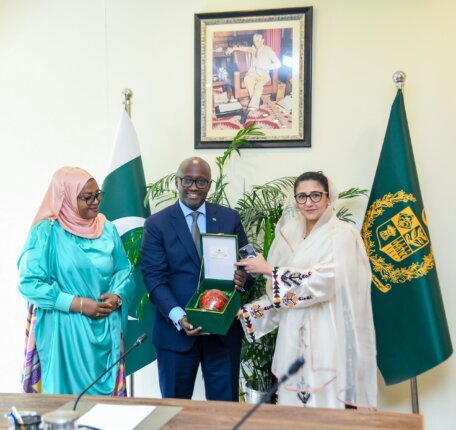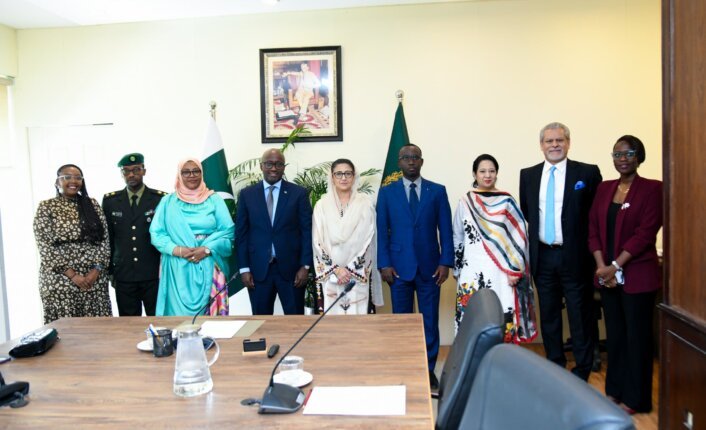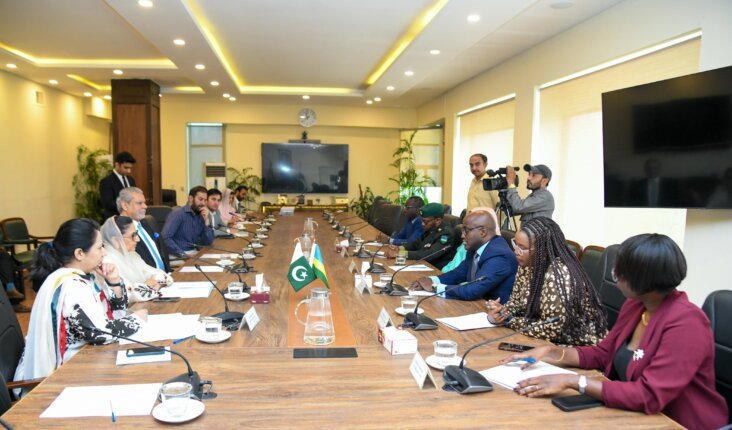Islamabad: In a significant move towards global environmental cooperation, the Minister of State for Climate Change and Environmental Coordination, Dr. Shezra Mansab Ali Khan, held a fruitful meeting with the visiting Rwandan delegation led by H.E. Ambassador Olivier J.P. Nduhungirehe, Minister of Foreign Affairs and International Cooperation of the Republic of Rwanda. The meeting focused on strengthening bilateral collaboration in climate resilience, sustainable development, and environmental governance.
During the meeting, Dr. Shezra Mansab Ali Khan highlighted Pakistan’s growing export capacity in sectors such as surgical instruments, pharmaceuticals, and sports goods, especially footballs. He also expressed the government’s commitment to initiating cultural exchange programs with Rwanda, emphasizing the importance of people-to-people engagement in furthering diplomatic and developmental ties.

The State Minister drew attention to the growing environmental challenges in Pakistan, particularly the alarming presence of plastic waste in the country’s seas and oceans. He admitted that despite policy measures, the implementation of the plastic ban remains incomplete, largely due to the concerns of the business community. However, he reaffirmed Pakistan’s resolve to tackle this issue and expressed a strong desire to learn from Rwanda’s exemplary efforts in eliminating plastic waste.
Ambassador Olivier J.P. Nduhungirehe shared Rwanda’s pioneering climate policies, which have earned global recognition. He spoke about Kigali’s transformation into a 100% sustainable and smart city powered by green infrastructure and carbon-free transportation. Rwanda’s total ban on plastic bags and single-use plastics, enforced since 2008, was highlighted as a model of effective environmental regulation. Other key initiatives include the promotion of green mobility through electric public transport, the monthly community clean-up practice known as Umuganda, and large-scale reforestation efforts like the Gishwati-Mukura forest corridor restoration.
Dr. Sherza underscored Pakistan’s vulnerability to climate-induced disasters such as floods and droughts. He stated that Pakistan’s National Disaster Management Authority (NDMA) has evolved into a highly advanced institution, equipped with the latest technologies to predict, monitor, and respond to disasters. He praised the NDMA’s capacity to even monitor global disaster trends, which is a testament to Pakistan’s growing technical proficiency in disaster management.

He further elaborated on Pakistan’s institutional and legal framework for climate action. The Pakistan Climate Change Act 2017, which led to the formation of the Pakistan Climate Change Council and Authority, was cited as a milestone in environmental governance. Provincial Environmental Protection Agencies (EPAs) are actively working to implement the Environment Protection Act. He also mentioned initiatives such as the safe disposal of hazardous chemicals, construction of climate-resilient buildings, and flagship programs like the Ten Billion Tree Tsunami and Recharge Pakistan, which aim to enhance flood resilience and ecosystem restoration.
Both sides agreed to explore joint ventures, technical collaborations, and investment opportunities in green technology, waste management, and climate adaptation strategies. They reiterated their commitment to advancing shared climate goals under the Paris Agreement and strengthening South-South cooperation for a greener, sustainable future.



